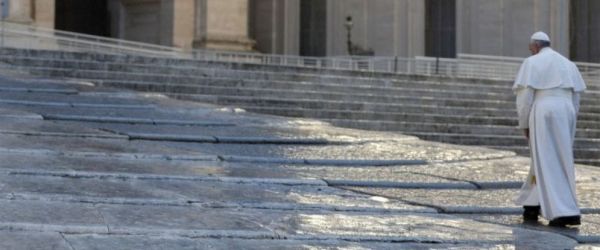This […] Gospel passage (cf. Mt 18:21-35) offers us a lesson on forgiveness which does not deny wrongdoing, but recognizes that human beings, created in God’s image, are always greater than the evil they commit. Saint Peter asks Jesus: “Lord, how often shall my brother sin against me, and I forgive him? As many as seven times?” (v. 21). To Peter, forgiving the same person seven times already seemed the maximum possible. And perhaps to us it may already seem too much to do so twice. But Jesus answers, “I do not say to you seven times, but seventy times seven” (v. 22), meaning always. You must always forgive. And he confirms this by telling the parable of the merciful king and the wicked servant, in which he shows the inconsistency of the man who was first forgiven and then refused to forgive.
The king in the parable is a generous man who, spurred by compassion, forgives an enormous debt — “10,000 talents”: enormous — to a servant who beseeches him. That same servant, however, as soon as he meets another servant like himself who owes him 100 dinarii — which is much less — behaves in a ruthless way and has him thrown in prison. The servant’s inconsistent behaviour is the same as ours when we refuse to forgive our brothers and sisters. Whereas the king in the parable is the image of God who loves us with a love that is so rich in mercy as to welcome us, love us and forgive us continuously.
From the time of our Baptism, God has forgiven us, releasing us from an intractable debt: original sin. But that is the first time. Then, with boundless mercy, he forgives us all our faults as soon as we show even the least sign of repentance. This is how God is: merciful. When we are tempted to close our heart to those who have offended us and tell us they are sorry, let us remember our Heavenly Father’s words to the wicked servant: “I forgave you all that debt because you besought me; and should not you have had mercy on your fellow servant, as I had mercy on you?” (vv. 32-33). Anyone who has experienced the joy, peace and inner freedom which come from being forgiven should open him or herself up to the possibility of forgiving in turn.
Jesus wished to introduce the teaching of this parable into the Our Father. He linked the forgiveness which we ask from God with the forgiveness that we should accord our brothers and sisters: “And forgive us our debts, as we also have forgiven our debtors” (Mt 6:12). God’s forgiveness is the symbol of his “overflowing” love for each of us. It is the love that leaves us free to distance ourselves, like the prodigal son, but which awaits our return every day. It is the resourceful love of the shepherd for the lost sheep. It is the tenderness which welcomes each sinner who knocks at his door. The Heavenly Father — our Father — is filled, is full of love and he wants to offer it to us, but he cannot do so if we close our heart to love towards others.
May the Virgin Mary help us to become ever more aware of the gratuitousness and the greatness of the forgiveness received from God, to become merciful like him, Good Father, slow to anger and great in love.
[Pope Francis, Angelus, 17 September 2017]












